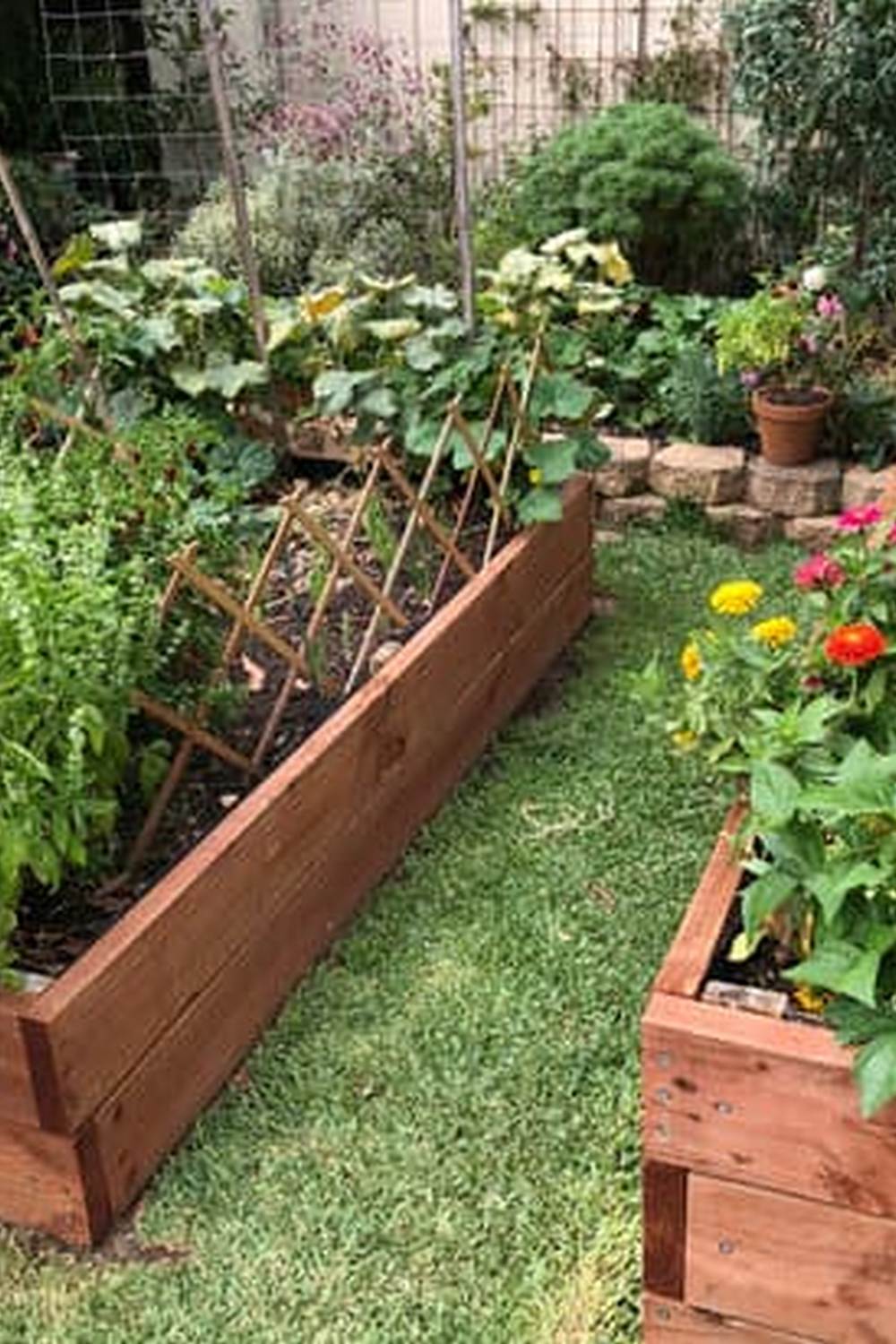When it comes to gardening, utilizing pallets can be a creative and cost-effective way to start your vegetable garden. However, not all pallets are suitable for this purpose, as some may contain harmful chemicals that can seep into the soil and affect your produce.
So, what kind of pallets are safe for vegetable gardening? In this article, we will explore the benefits of using pallets for vegetable gardening, what to consider when choosing pallets, the types of pallets that are safe for this use, where to source them, and how to properly prepare and treat them.
Using pallets in vegetable gardening has become increasingly popular due to their versatility and eco-friendly nature. Not only do they provide structure for vertical gardens or raised beds, but they also help with space optimization and organization. By upcycling pallets for gardening purposes, you not only reduce waste but also add a rustic charm to your garden.
When selecting pallets for your vegetable garden, it is crucial to consider the materials used in their construction. Opt for untreated hardwood or heat-treated (HT) pallets that have been certified safe for international shipping standards. Avoid using chemically treated or painted pallets that may contain harmful substances like lead or arsenic. By choosing the right type of pallets, you can ensure a healthy environment for your plants and produce while minimizing potential risks to your health and the ecosystem.
Benefits of Using Pallets for Vegetable Gardening
Using pallets for vegetable gardening comes with a plethora of benefits that can enhance your gardening experience. One of the primary advantages is the cost-effectiveness of pallets. Pallets are often easily accessible and sometimes free, making them a budget-friendly option for creating raised beds or vertical gardens in your vegetable garden. Additionally, reusing pallets for gardening helps reduce waste and promotes sustainability by repurposing materials that would otherwise end up in landfills.
Another benefit of using pallets for vegetable gardening is their versatility. Pallets can be customized to fit the specific needs and constraints of your garden space. Whether you have limited room for gardening or want to create a unique design element in your outdoor space, pallets offer a flexible solution. They can be stacked, leaned against a wall, or disassembled to create different configurations that optimize space and sunlight exposure for your vegetables.
Furthermore, using pallets in vegetable gardening can help improve drainage and prevent soil compaction. By elevating your plants off the ground with raised beds made from pallets, you create better airflow around the roots and reduce the risk of waterlogging. This can lead to healthier plants with stronger root systems and increased resistance to pests and diseases. Ultimately, incorporating pallets into your vegetable garden design can contribute to a more productive and sustainable growing environment.
| Benefits | Advantages |
|---|---|
| Cost-effective | Reduces waste |
| Versatile | Improves drainage |
| Customizable | Prevents soil compaction |
What to Consider When Choosing Pallets for Your Vegetable Garden
When choosing pallets for your vegetable garden, there are several factors to consider to ensure the safety and success of your gardening project. One of the key considerations is the type of wood used in the pallets. Opt for untreated or heat-treated hardwood pallets, as they are less likely to contain harmful chemicals that could leach into the soil and affect the quality of your vegetables. Avoid using pallets that have been chemically treated with pesticides or fungicides.
Another important factor to consider is the condition of the pallets. Inspect the pallets carefully for any signs of damage, such as splinters, mold, or rot. Using damaged pallets can pose a risk to both your plants and yourself. Look for sturdy and structurally sound pallets that are free from contaminants.
It’s also essential to choose pallets that are the right size for your gardening needs. Consider the dimensions of your garden space and determine how many pallets you will need to create raised beds or vertical planters. Additionally, think about how you plan to arrange the pallets in your garden to maximize sunlight exposure and airflow for your vegetables. Remember to prioritize functionality and efficiency when selecting pallets for your vegetable garden.
| Factors to Consider | Guidelines |
|---|---|
| Type of Wood | Choose untreated or heat-treated hardwood |
| Condition | Inspect for damage like splinters, mold, or rot |
| Size | Select appropriate dimensions based on garden space |
Types of Pallets Safe for Vegetable Gardening
When it comes to choosing the right pallets for your vegetable garden, safety is a top priority. Not all pallets are created equal, and certain types may contain harmful chemicals or residues that can leach into your soil and affect the health of your plants. The key is to opt for pallets that are safe for vegetable gardening, ensuring a healthy environment for your crops to thrive.
One of the safest types of pallets for vegetable gardening are those that have been heat-treated (HT) or kiln-dried. These pallets are free from chemical treatments like methyl bromide, making them a great choice for organic gardening. Look for the “HT” or heat-treated stamp on the pallet to ensure that it has been properly treated without the use of harmful chemicals.
Another safe option for vegetable gardening is using plastic pallets. These pallets are resistant to moisture and won’t rot or splinter over time like wooden pallets. Plastic pallets are also easy to clean and sanitize, reducing the risk of contamination from harmful substances. Additionally, plastic pallets can be a more durable and long-lasting choice compared to traditional wooden pallets.
Where to Source Safe Pallets for Vegetable Gardening
When looking for pallets to use in your vegetable garden, it is essential to ensure that they are safe and free from harmful chemicals that could potentially contaminate your produce. Here are some sources where you can find safe pallets for vegetable gardening:
- Hardware Stores: Many hardware stores sell new pallets that have not been treated with chemicals. These are a good option if you want to start with clean and safe pallets.
- Local Farms or Garden Centers: Reach out to local farms or garden centers in your area. They may have used pallets that are safe for vegetable gardening and are willing to give them away or sell them at a low cost.
- Online Marketplaces: Websites like Craigslist, Facebook Marketplace, or Freecycle often have listings for free or inexpensive pallets. Just be sure to ask the seller about the history of the pallets and whether they have been used to transport any harmful materials.
It’s important to remember that not all pallets are created equal, and some may have been treated with chemicals or pesticides that can leach into the soil and affect the quality of your vegetables. Always do your due diligence when sourcing pallets for your vegetable garden to ensure that they are safe for use.
Additionally, consider reaching out to local businesses or warehouses that receive goods on pallets regularly. They may have surplus pallets that they are looking to get rid of, which can be a great source of free or low-cost materials for your vegetable garden. By being proactive and thoughtful about where you source your pallets, you can create a beautiful and bountiful garden while ensuring the safety of your produce.
How to Prepare and Treat Pallets for Vegetable Gardening
When it comes to using pallets for vegetable gardening, it is essential to properly prepare and treat them to ensure the safety of your plants and yourself. Before repurposing a pallet for your garden, it’s crucial to know where it has been previously used and what it may have been treated with.
Some pallets are treated with chemicals that can be harmful to vegetables or even humans if not handled correctly. Therefore, taking the necessary steps to prepare and treat the pallet will help create a safe environment for your garden.
Inspecting the Pallet
Before using a pallet for your vegetable garden, carefully inspect it for any signs of damage or chemical treatments. Look for markings on the pallet that indicate whether it has been heat-treated (HT) or chemically treated (CT). It is best to avoid using pallets that have been chemically treated, as they may contain harmful substances like methyl bromide.
Cleaning and Sanding
Once you have selected a safe pallet for your vegetable garden, the next step is cleaning and sanding it down. Use a stiff brush, mild soap, and water to clean the surface of the pallet thoroughly. After cleaning, allow the pallet to dry completely before sanding down any rough spots or splinters. This will help prevent any potential hazards while handling the pallet and ensure a smooth surface for planting vegetables.
Treating the Pallet
To further ensure the safety of your vegetable garden, consider treating the pallet with a non-toxic sealant or paint. This will help prolong the lifespan of the pallet by protecting it from moisture and pests.
Be sure to use eco-friendly products that are safe for edible plants and follow the manufacturer’s instructions for application. By taking these precautions, you can create a durable and safe foundation for your vegetable garden while also adding a touch of personalization with different colors or finishes on the pallets.
Creative Ways to Repurpose Pallets in Your Vegetable Garden
Pallets are not only functional for building raised beds and planters in your vegetable garden, but they also offer a versatile way to repurpose them creatively. Here are some innovative ideas on how you can repurpose pallets in your vegetable garden:
Vertical Gardening
One creative way to use pallets in your vegetable garden is by turning them into vertical gardens. By attaching pots or pockets to the slats of the pallet, you can create a space-saving and visually appealing way to grow herbs, strawberries, and other small vegetables. Vertical gardening with pallets not only maximizes space but also adds a unique aesthetic element to your garden.
Compost Bins
Another eco-friendly way to repurpose pallets in your vegetable garden is by transforming them into compost bins. By assembling the pallets into a three-sided structure, you can easily contain and aerate your compost pile. This not only helps in reducing waste but also provides nutrient-rich compost for your plants.
Garden Tool Organizer
Pallets can also be utilized as a DIY garden tool organizer in your vegetable garden. By adding hooks, shelves, and compartments to the pallet, you can efficiently store and organize your gardening tools such as shovels, trowels, gloves, and watering cans. This simple yet effective solution helps keep your tools within reach while keeping your garden area clutter-free.
By using pallets creatively in your vegetable garden, you not only add a touch of character but also contribute to sustainable gardening practices by repurposing materials that would otherwise go to waste. These ideas showcase how versatile pallets can be beyond just their traditional use in construction and shipping industries.
Maintenance Tips for Pallets Used in Vegetable Gardening
When it comes to using pallets for vegetable gardening, proper maintenance is essential to ensure they remain safe and functional for your plants. Here are some tips on how to maintain and prolong the lifespan of pallets used in your vegetable garden:
- Regular Cleaning: Over time, dirt, mold, and mildew can accumulate on pallets, which can be harmful to your plants. Regularly clean your pallets with a mixture of water and vinegar to keep them free from any unwanted substances.
- Inspect for Damage: Inspect your pallets frequently for any signs of damage such as splinters, rot, or loose boards. Replace any damaged pallets immediately to prevent issues with stability and safety in your garden.
- Protect Against Weather: Prolonged exposure to the elements can weaken pallets over time. Consider applying a weatherproof sealant or paint to protect them from moisture, UV rays, and other environmental factors.
In addition to these maintenance tips, proper storage of pallets during the offseason is crucial in preserving their integrity. Store them in a dry location away from the ground to prevent moisture buildup that can lead to rotting. By following these maintenance guidelines, you can ensure that your pallets will continue to serve as a reliable and safe foundation for your vegetable garden.
- The benefits associated by using adequately treated wooden platforms are very significant; namely by doing this we ensure they would not transmit any toxic substance onto our veggies thus preventing soil contamination.
- A great way of assuring you are procuring safe wooden platforms consists in buying EPAL-certified ones which gives you comfort knowing these are thoroughly checked and up-to-coding.’
Conclusion and Final Thoughts
In conclusion, when it comes to choosing pallets for your vegetable gardening projects, it is essential to prioritize safety and sustainability. Opting for heat-treated or untreated hardwood pallets that are free from harmful chemicals ensures that your plants remain healthy and safe for consumption.
It is crucial to be aware of the potential risks associated with using certain types of pallets, such as those treated with pesticides or chemicals, which can leach into the soil and affect the quality of your produce.
Additionally, sourcing safe pallets for vegetable gardening can be done through local businesses, nurseries, or online suppliers that specialize in providing reclaimed or untreated pallets. By taking the time to properly prepare and treat your pallets before use in the garden, you can prolong their lifespan and maintain a healthy growing environment for your vegetables.
Investing in quality materials for your gardening projects not only benefits your plants but also contributes to a more sustainable and eco-friendly approach to gardening.
Overall, incorporating pallets into your vegetable garden not only adds a unique aesthetic element but also offers practical benefits such as space-saving solutions and efficient drainage systems. By following proper maintenance tips and exploring creative ways to repurpose pallets in your garden design, you can create a thriving and sustainable vegetable garden that will yield bountiful harvests for years to come.
Remember to always prioritize safety and sustainability when selecting materials for your gardening projects, as this will ultimately determine the success of your efforts in growing fresh produce at home.
Frequently Asked Questions
How Do I Know if My Garden Pallets Are Safe?
To ensure that your garden pallets are safe, you can start by checking for any visible stamps or markings that indicate they have been heat-treated (marked with “HT”) instead of chemical treatment. Heat-treated pallets are safer for gardening.
How Can You Tell if a Pallet Has Been Chemically Treated?
One way to tell if a pallet has been chemically treated is by looking for the stamp “MB” which indicates it has been treated with methyl bromide, a harmful pesticide. Avoid using pallets with this stamp in your garden to prevent any contamination.
What Pallets Are Good for a Garden?
Pallets made of untreated or heat-treated wood are good options for a garden because they are less likely to contain harmful chemicals that could leach into the soil and affect your plants. These types of pallets are safe for creating raised beds or compost bins in your garden.

If you’re looking to get into vegetable gardening, or are just looking for some tips on how to make your current garden better, then you’ve come to the right place! My name is Ethel and I have been gardening for years. In this blog, I’m going to share with you some of my best tips on how to create a successful vegetable garden.





